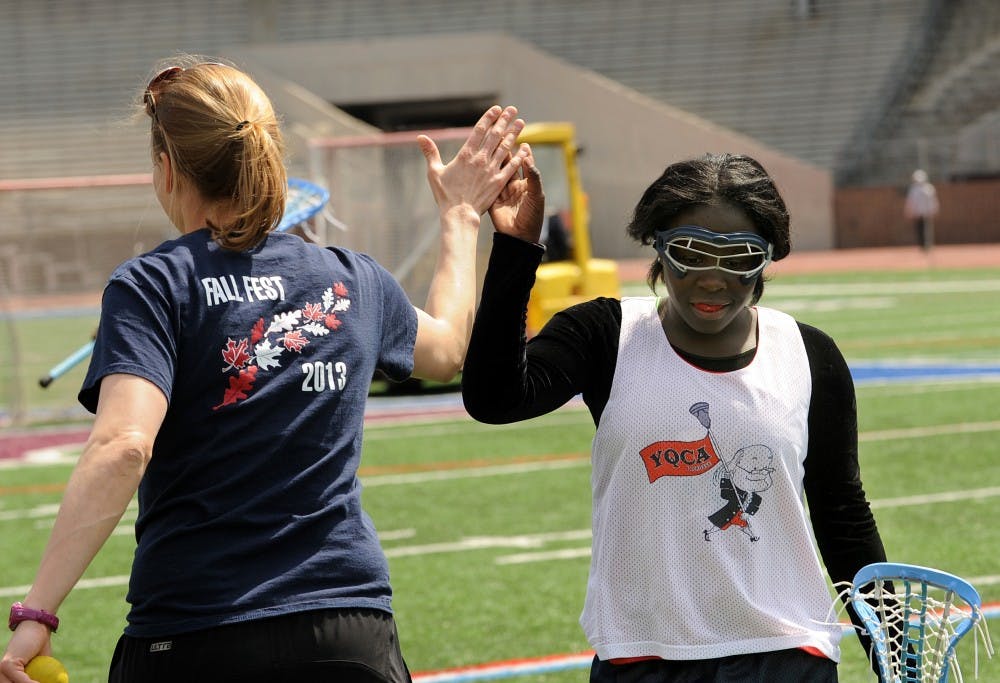Across all sports, it’s almost a universal rule: you never want to look too far ahead.
But for Penn women’s lacrosse, there are times when a future-minded approach is the only way to go.
Accompanied by Penn’s track and field and men’s lacrosse squads, the team is in its third year working with Young Quakers Community Athletics, an after-school sports program that pairs Penn athletes with students from a trio of local middle schools.
“I love it because it makes an impact on their lives, and at the same time, they impact our lives so much,” freshman defender Teia Ross said. “Seeing how excited the kids are to come and hang out with us, making really personal relationships with all the kids — they really start to trust the Big Quakers, and it’s great to see that.”
Though the program wasn’t started until January 2015, the roots between YQCA and Penn lacrosse are decades in the making.
Since graduating from Penn in 1981, former men’s lacrosse standout Charles Leitner has become the chairman of the Board of Overseers for Penn Athletics. Shortly after his older daughter, Emily, graduated from Penn in 2012 following a career as a goalie under women’s lacrosse coach Karin Corbett, the elder Leitner came to his daughter’s coach with a plan — and from there, the rest was history.
“This is [Chuck’s] brain-child ... he’s been such a great mentor in every way, and I completely believe in what he backs,” said Corbett, who also currently coaches Leitner’s younger daughter, junior defender Maureen. “He was so excited telling me about it, and you got excited about hearing his joy for it.”
As one would expect, a major portion of YQCA involves Corbett’s athletes instructing the “Young Quakers” on the field, enabling the “Big Quakers” to be on the opposite side of the player-coach relationship.
“I hope we give them some of the characteristics that you can get from being part of a team and playing sports, especially as a girl,” senior defender Megan Kelly said. “Building relationships with the girls and having them trust you, having them set goals and be excited about lacrosse and about being part of a team, that’s really rewarding.”
Of course, athletic expertise is far from all the Penn players have to offer. The Big and Young Quakers spend sessions off the field together, allowing the elder students to share important academic advice in addition to general bonding.
As such, it’s not merely fun and games when these underprivileged students visit — with the positive influences that the Big Quakers can provide, these players have the opportunity to change lives.
“I think that the sports aspect really helps them connect to us, but then talking to them during team time, they can see what kind of people we are, and that helps inspire them to want to go to college,” Ross said. “A lot of them have said, ‘Oh, I really want to go to Penn now, I love it here.’”
While the experience is thoroughly rewarding to the Young Quakers, the benefits that come to them are matched by those that come to Penn’s athletes, who have come to embrace the intrinsic satisfaction that results from escaping the “Penn bubble” and making a greater impact on the local community.
“We’re so fortunate here, and we’ve been given so many opportunities through sports, that it’s really important to give back to these girls,” Kelly said. “It really puts things back into perspective for us. When we’re stressed about practice or school, we see these girls and are reminded why we play the sport.”
In fact, for Kelly and Ross, the desire to help out goes even beyond their own team’s involvement. Both are enrolled in “Urban Athletics and Human Movement,” an academically-based community service course that also works with YQCA.
“I’d really like to continue to benefit the program,” Ross said. “Not just by volunteering, but by analyzing the program to help see in what ways we can continue to help, if it has to do with more logistical things and not just our personal relationships with the kids.”
Ultimately, once the regular season rolls around, it’ll be business as usual for Corbett’s squad. Coming off their first NCAA Quarterfinal appearance since 2010, the Quakers will be hell-bent on maintaining their status as a national power.
But no matter what happens in between the whistles, the Red and Blue have already taught one key lesson — sometimes, the wins and losses aren’t all that matter.









